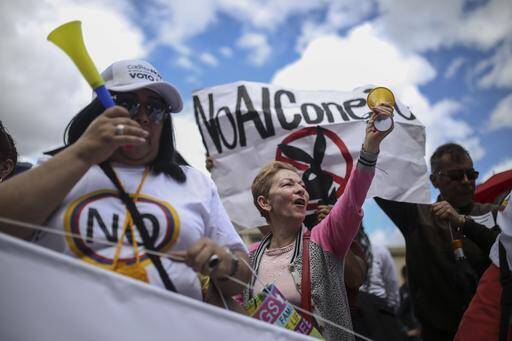Congress formally ratified a revised peace agreement with Colombia's biggest leftist rebel group, capping a torturous four years of negotiations, a stunning referendum rejection, last-minute compromises and two signing ceremonies.
The initial pact was narrowly rejected by voters last month, and President Juan Manuel Santos decided to skip a referendum on the new version and go directly to congress, where the deal's supporters hold a majority. Opponents, led by former President Alvaro Uribe, boycotted the legislative votes, which resulted in unanimous approval by the Senate on Tuesday and by the lower house late Wednesday.
The new 310-page accord with the Revolutionary Armed Forces of Colombia introduced 50 changes to the initial deal in an attempt to assuage opponents as the government seeks to end a 52-year conflict that has killed more than 220,000 people and driven almost 8 million from their homes.
The modifications include a prohibition on foreign magistrates judging alleged crimes by government or FARC troops, and a commitment from the rebels to forfeit assets, some amassed through drug trafficking, to help compensate victims. But the FARC rejected demands for jail sentences for rebel leaders responsible for atrocities and stricter limits on their future participation in politics.
The compromises weren't enough for some of the deal's opponents.
"There needs to be a balance between peace and justice, but in this agreement there's complete impunity," Uribe, now a senator, said during the Senate debate. Other senators accused him of standing in the way of a peace deal that he pursued with the FARC as president in 2002-10.
Santos said ratification will set in motion the start of a six-month process in which the FARC's 8,000-plus guerrillas will concentrate in some 20 rural areas and turn over their weapons to United Nations monitors. "Tomorrow a new era begins," he said Wednesday.
But the rebels insist their troops won't start demobilizing until lawmakers pass an amnesty law freeing some 2,000 rebels in jail.
"D-Day starts after the first actions are implemented," the rebel leader Pastor Alape, part of the FARC's 10-member secretariat, said last week after the new accord was signed. "The president unfortunately has been demonstrating an attitude that creates confusion in the country."
The debate over amnesty highlights one of the peace deal's early challenges: the need for congress to pass legislation implementing the accord and setting up special peace tribunals.
Santos was initially counting on swift approval of the needed changes that in some cases require constitutional amendments. But the referendum loss has left the status of his fast-track authority in doubt, awaiting a ruling by the constitutional court. Experts say a solid pro-peace coalition could crumble if implementation drags on and butts against the political maneuvering for the 2018 presidential election.
Beyond the legal hurdles, there is also concern FARC fighters will wind up joining criminal gangs rampant across Colombia or the much-smaller rebel National Liberation Army, which for months has been playing cat and mouse with the government over opening a peace process of its own. On Wednesday, both sides said they would delay until January any decision about when to start talks.
Combating security threats will test the state's ability to make its presence felt in traditionally neglected rural areas at a time of financial stress triggered by low oil prices.
There is also a risk that peace could trigger more bloodshed, as it did following a previous peace process with the FARC in the 1980s. At that time, thousands of former guerrillas, labor activists and communist militants were killed by right-wing militias, sometimes in collaboration with state agents.
Worries about new bloodshed, although less prevalent than in the darker days of Colombia's half-century conflict, has become more urgent with more than a dozen human rights defenders and land activists in areas dominated by the FARC being killed by unknown assailants since the initial signing ceremony in September. So far this year, 70 have been killed, according to Bogota-based We Are Defenders, more than in all of 2015 and 2014.
Copyright 2016 The Associated Press. All rights reserved. This material may not be published, broadcast, rewritten or redistributed.








